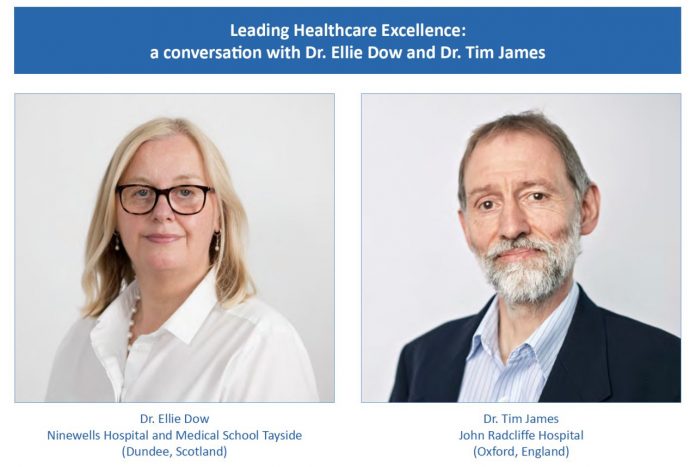As steward of analytical health, the clinical laboratory is uniquely positioned to lead and/or contribute to strategic integrated clinical care initiatives that drive measurably better healthcare.
Two leading experts with globally recognized best practices in this area are Dr. Ellie Dow, Consultant in Biomedical Medicine, Blood Sciences at Ninewells Hospital and Medical School Tayside (Dundee, Scotland) and Dr. Tim James, head biomedical scientist in the Clinical Biochemistry Department at the John Radcliffe Hospital (Oxford, England).
Among many commonalities, both leaders are active champions with proven success on the power of laboratory medicine to drive advancements in patient care, clinical decision-making, strategic problem solving and healthcare excellence. In 2019, both were independent and elite recipients of the 2019 UNIVANTS of Healthcare Excellence Awards and have more recently, joined as guest editors for a special issue in the eJIFCC on Measurably Better Healthcare Performance.
For those interested in learning more about the special issue or submitting a manuscript on this topic, please email your manuscript to ejifccspecialissue@gmail.com and ejifcc@ifcc.org by November 15, 2020. For those interested in learning more about the UNIVANTS of Healthcare Excellence Awards and/or the globally-recognized best practices associated with the healthcare excellence program, including those from Dr. Ellie Dow
and Dr. Tim James, please visit www.UnivantsHCE.com.
How important is the clinical laboratory in healthcare today?
Tim:
There is no better evidence of the importance of laboratories in healthcare today than our integral role in responding to the COVID-19 pandemic. Initial diagnosis, management of patients through the escalation of treatment, and population assessments are all dependent on the clinical laboratory. Equally, as we emerge from the COVID-19 peak, the agenda for re-establishing the ‘new’ normal will require re-engagement of what laboratory services can offer in re-engineered patient pathways. I believe this is a great opportunity for all of us.
Ellie:
The clinical laboratory is the engine hidden under the hood of care – without this, the car doesn’t go anywhere. Clinicians can still use their clinical acumen and diagnostic skills, but there is no reassurance or confirmation without laboratory diagnostic testing. Last year, we had a lightning strike that completely took out our local laboratory service, and without the ability to send samples to a nearby sister hospital, which retained some functions, it is likely that our hospital would have closed to acute admissions. Our medical staff were flying blind, and truly valued when we were able to resume service as usual.
What advice do you have for clinical laboratory teams who are aiming to be more strategically involved in their health systems?
Tim:
Make yourself available to service users and ensure that you are easy to contact. When I look at some websites, I struggle to find the contact names for the laboratory – almost as if by design.
This is true even for laboratory-based websites, so if someone wanted to discuss any issue with the lab team, there are immediate barriers already. Equally as important is pro-actively and positively following up with all contact opportunities whenever possible, whether it is within clinical, management or academic settings.
Ellie:
It’s really about getting out of the office and out of the lab, making and expanding those cross-discipline connections, and building those networks. In addition, in-person contact – as much as possible – cannot be under-estimated for establishing rapport and trust. If in-person meetings are not possible or restricted during this pandemic, face to face contact over video calls is still more ideal than the remote use of emails.
What critical success factors have worked best for you and your teams?
Tim:
Following through with what you say you would do. When resources are stretched, it can be difficult to keep up with all the commitments asked of us, but if you deliver on them, it builds trust and confidence in your services. More critical, however, is the importance of the teams –building them, sharing difficulties and making sure that successes are communicated and positively reinforced.
Ellie:
Lots of regular contact, often face to face including informal “drop-in” meetings and exchanging ideas; these collective factors help ensure that everyone on the team feels valued in their role.
What is the first step to getting started?
Tim:
Be realistic and deliver on a small number of user engagements well. Do not take on too much too soon and don’t be disappointed in yourself if it doesn’t always work…but rather learn from all you do through reflection.
Ellie:
If you’re new to your institution, or new to this style of working, then I would recommend getting out the lab and talking to people at as many local meetings as you can – whether clinical, managerial or academic meetings. Be approachable and keen, show that you have a “can-do” attitude and want to make things work and solve problems. Speaking at local grand rounds is also excellent for expanding networks and participating (or even driving) new team discussions!
How have your best practices made a difference to your patients, health systems
or to you and your teams personally?
Tim:
The work we have undertaken on pre-eclampsia markers has had a high profile because of the short time between our study work (mainly the INSPIRE study) and translation into routine practice. This resulted in follow up interactions from around the world to both the lab and the obstetric teams, helping others establish similar services. The effort has therefore not only benefit patients in our hospital, but across the UK and globally. I think our entire team has each had a “feel-good” factor as a consequence of our work together.
Ellie:
We know that patients in Tayside are getting properly investigated for abnormal liver function, and the strength of the programme is recognized nationally. We’re getting the right patients at our liver clinics.
For the team, we have more confidence, and are known to our senior management. The core laboratory team all play a role in making our programme work smoothly and share in its success. For me personally, I’ve had lots of opportunities to travel globally while presenting on the team outcomes and meeting many wonderful people.
What types of manuscripts would you like to see submitted to the eJIFCC special issue on Measurably Better Healthcare?
Tim:
Manuscripts that capture quality improvements well in terms of outcomes. This may be a quality metric within the lab, but it would be stronger if it showed shared involvement with clinical teams. Early in my career, probably 30 years ago, we worked on improvements to communication of test results with our clinical teams with a primary outcome of an 80% reduction in phone calls which both clinicians and the laboratory felt were unnecessary. The manuscript describing this never got published, as reviewers felt we could not identify the relative contribution of the concurrent changes that we had made. Scientifically, I understand that position completely now, but as a poster presentation, it raised more discussion and engagement than anything else I have done subsequently. So, I guess I am interested in capturing scientifically sound manuscripts which share good ideas and open discussion.
Ellie:
Manuscripts that show the strength of clinical and laboratory teams working together to improve healthcare, no matter in what setting, with measurable KPIs appropriate to the project and setting, whether that’s rural Africa or a clinic in Europe. Demonstrably better healthcare together!




















































